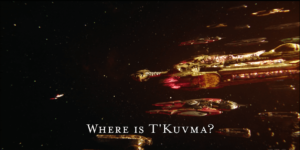 It’s interesting to note who the villains are in this episode. In Klingon culture, T’Kuvma is a member of a disgraced house; a lower class, if you will. Unprivileged. The 99%. The marginalized. He accepts outcasts into his group, embracing the refugee. He is building community.
It’s interesting to note who the villains are in this episode. In Klingon culture, T’Kuvma is a member of a disgraced house; a lower class, if you will. Unprivileged. The 99%. The marginalized. He accepts outcasts into his group, embracing the refugee. He is building community.
That’s our villain. Bold choice.
And unlike our Messiah, the Klingons’ Messiah gets them to do what he wants by lying to them.
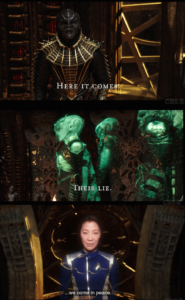 The Klingons’ soon-to-be Savior, T’Kuvma, has engaged in a clever rhetorical tactic: predicting what his opponent will say, and pre-characterizing it as something that it does not mean. He says that the Federation will come with their insult and their fatal greeting, “we come in peace,” so that when the Klingons hear those words, they will assume it means exactly what he said it does, even though he gives them no reason to believe it means what he said it does. He even times its utterance, “Here it comes,” right before she says it. Oh what a prophet, T’Kuvmy, you nut!
The Klingons’ soon-to-be Savior, T’Kuvma, has engaged in a clever rhetorical tactic: predicting what his opponent will say, and pre-characterizing it as something that it does not mean. He says that the Federation will come with their insult and their fatal greeting, “we come in peace,” so that when the Klingons hear those words, they will assume it means exactly what he said it does, even though he gives them no reason to believe it means what he said it does. He even times its utterance, “Here it comes,” right before she says it. Oh what a prophet, T’Kuvmy, you nut!
We hear this done in political rhetoric today. One example is called the Dog Whistle. It presumes implications to words which they do not have, and which those who speak them do not mean. By pre-contextualizing the mere use of the words as shameful, this tactic’s use is intended to take them out of a conversation in which they belong; because if they were in the conversation, it would not go as those who assault meaning want it to go.
Watching the episode, we know that when Captain Philippa Georgiou says, “We come in peace,” what she actually means is… “We come in peace.” She means nothing else by it, and the episode gives us the insight to know that with certainty.
Even if the cool kids are doing it, we should never put our own meanings into the words that come out of other people’s mouths, as if by being offended at something we gain ownership over language. It’s dishonest and cheap, and it rightly blows our credibility.
Proper Incriminations
The Captain’s mistake is assuming that her enemies think as she does, that peace is always anyone’s ultimate desire. That people only fight because they can’t get it. It would not occur to her that the entire point of this setup was to start a fight; so that, with a common enemy, the Klingon Empire could unite, and then likely enjoy some freewheeling conquering.
Michael’s mistake came from doing the right thing at the wrong time. This correct thing involves placing what’s right above the rules, eschewing the sin of loyalty.
That’s a head-turner, isn’t it. Here’s what I mean, best said by Harry Blamires in his book, “The Christian Mind”:
“Loyalty is, in itself, not a moral basis for action. Loyalty to a good man, a good government, a good cause, is of course a different matter. But in these cases, where one stands by a man, or a government, or a cause, because it is good, one is standing by the good. The basis of action in these cases is moral in that one is serving the good; and thus the concept of loyalty is redundant.”
When the right person is doing a wrong thing, you do not stand by the action, even though you still have your friend’s back. That’s the point, I agree with it, and usually it must be followed. This was not the time for Burnham, though, because she was trying to force her people to engage in a tactic that was not natural to them. Even though it had worked for the Vulcans, that did not mean that it would work for the Federation; as a group, they could not mutually embrace the reasoning behind it. She’s not wrong, but with her team opposed to the very notion of punching first, it simply would not happen well.
Her first real mistake was the mutiny, which her people universally see as a breach. It makes her the bad guy.
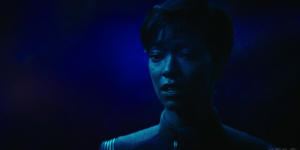
Improper Incriminations
But she most certainly did not start a war. She will blame herself for it: and that is her second real mistake, because the war was orchestrated. It was a set-up, hers just happened to be the foot which went into the bear trap. In episode 1, if she hadn’t killed the hull-walker, she would be dead, the Klingons would have continued their setup, Captain Georgiou and Saru would still do their bomb thing—all would play out the same. If she hadn’t mutinied, all would have played out the same. In the war plot, she was a non-agent.
Late in the story, Michael is on the receiving end, having her convictions over-ridden by others, as Saru beams her out of the Klingon ship when she wants to retrieve the Captain’s body. You reap what you sow. When you make a decision, even a moral one, you will face consequences, some of which will be unjust, but still follow inevitably.
Captain Philippa Georgiou fell into the Klingon setup as much as Michael did. She will not be blamed, though. The Captain acted according to the rules, and terrible things happened; things that would have happened anyway. Michael acted against the rules, and things happened that would have happened anyway. But it’s a case of ‘We Need A Villain,” and Michael has done the mutiny, making her a good villain candidate: so she can be blamed for something that anyone paying attention to the facts would realize does not belong on her shoulders. She did not start a war, even if she agrees that she did.
It’s weird how we have another kind of corruption of the true Messiah in the same episode. She accepts the weight of the greatest sin of her time, one that affects everyone—starting a galactic war. She chooses this, though in her case, it’s via some self-deception. She is hated by the masses. There are quite a few connections with history, and there’s nothing evil in this askew connection; most metaphors just don’t bear close examination, and representing Christ wasn’t the point of this Discovery story. It still can be helpful for us to understand the truth through the comparisons and contrasts.
Was Jesus just a good man? A moral teacher? A progressive ethicist who willingly died for his ideas? Is it enough to solve the problem with the universe if He was just a man? Here’s a nice example of what can sometimes happen when a good person, thoughtful, moral and decent, takes the blame and bears the sins of everyone.
Nothing good.
“Why are we fighting? We’re Starfleet. We’re explorers, not soldiers.” – Danby Connor
After episode 2, that question will no longer make sense.
We ignore the details of any truth at our peril, and everyone else’s too.
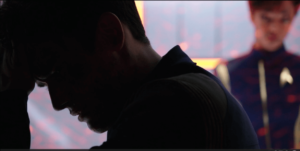
• • •
Trektember is an annual series about Star Trek; this year, we’re examining the first seasons of Star Trek: Discovery and The Orville. For more information on this series, click here; or, to read every article from the beginning, click here!

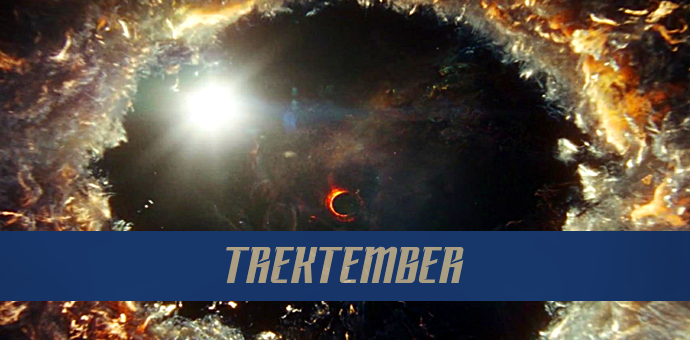
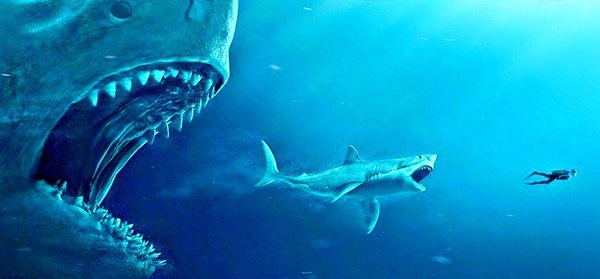
3 comments